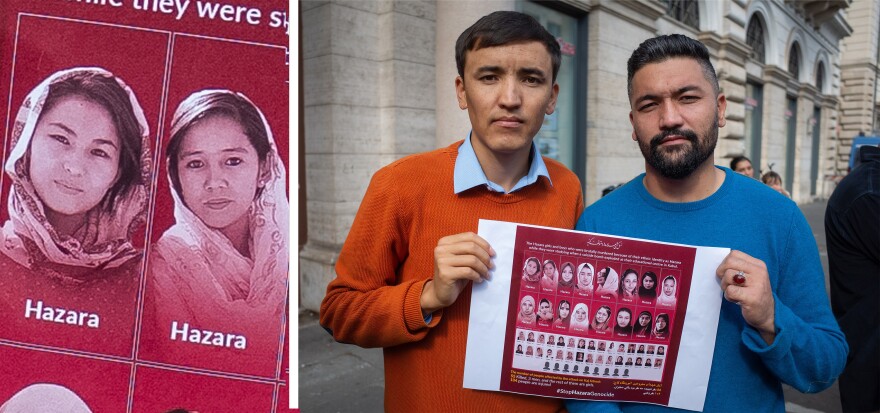Editor's note: On Oct. 5, we published a story with the headline: The diary of an Afghan girl killed in bombing reveals a list of unfulfilled dreams. Freelance reporter Ruchi Kumar wrote about 16-year-old Marzia Mohammadi, one of 53 people, mainly girls, killed in a suicide bombing attack on Sept. 30 on the Kaaj learning center in Kabul's predominantly Hazara ethnic neighborhood. The teenager's uncle found her diary after her death and shared it with us. She had written about her goals for the future – from riding a bike (not possible for women and girls under Taliban rule) to writing a novel to eating pizza in Italy.
Soon after this tragic event, Pierre Kattar, the visuals editor for the story, went to a demonstration by Afghans in Rome – and had a remarkable encounter.

A week after a suicide bomber killed 53 students in Kabul's predominantly Hazara ethnic neighborhood, an Afghan friend sent me a poster via WhatsApp promoting a protest against attacks on Hazaras — largely Shia Muslims who have historically been persecuted by Sunni militant groups.
The protest was emotional and intense. A white smoke flare was set off, young women hit the ground and played dead. They were re-enacting the suicide bombing. A mother clutched her child and sobbed into his hair. Everywhere I looked, I saw tears. It was heartbreaking.
The crowd began chanting "Stop Hazara genocide! Stop Hazara genocide!" Many wept as they chanted.
I started taking pictures.

I noticed two men holding a large poster with pictures of the young women who were killed in the suicide bombing, and I recognized two of the faces right away: Marzia and her best friend and cousin, Hajar.
Just a few days before, I was reviewing photos of the girls sent to us by Marzia's family. I pulled the story up on my phone and showed it to the men holding up the poster. The man in the blue sweater looked at me, paused and said, "I was their teacher."
He began tearing up and looked away. I hugged him, said I was so sorry and stepped back.
He introduced himself as Hamidullah Hussaini and told me he had taught math to Marzia and Hajar for 7 years.
Hussaini, 29, said their their love of learning energized him and that they were the best students in his class.
Hussaini was not at the school when the bombing took place.
He told me his story of a narrow escape from the Taliban. Taliban members showed up at the private school for girls where he taught. It was Oct. 19, 2021 – shortly after they re-took power in Afghanistan.
They asked the principal to show them surveillance footage from inside the classrooms; there were cameras everywhere throughout the school for security reasons. The principal obliged.
That's when the Taliban men saw one of Hussaini's lectures. He was a math teacher but had degrees in economics and business management. In the footage, he was lecturing about how worse off the economy was since the Taliban banned women from getting an education and being able to work.
The Taliban wanted to know where Hussaini was. The principal quickly texted the teacher to warn him. Hussaini ignored the text because he was in the middle of a lesson. Then, the principal called him and urged him to leave as soon as possible.
He stopped teaching, abruptly ended his class and fled through a back door. He went home and left Kabul the next day. He took refuge in Afghanistan's Daykundi Province, which is far from the capital and has a majority of ethnic Hazaras.
In January, Hussaini went to Iran, where he applied for asylum to Italy. In April, he finally arrived in Rome.
I asked Hussaini how well he knew Marzia and Hajar and what they were like. His face lit up. He said they came from humble backgrounds – their parents are shopkeepers – and that they truly loved learning. They were his top students. If one of them had the best grade in the class, then the other would be number 2. He said their love for learning energized him.
He remembered something the girls said to him at a local event known as Teachers Day. It was Oct. 5, 2020. Marzia and Hajar told him: "We will make your face white."

It was a saying I'd not heard before. Hussaini explained that it's a phrase used in Afghanistan. It means they were going to make him proud with all of their future accomplishments.
The last time he saw Marzia and Hajar was the day he abruptly left school. The two young women had come in to pick up books to study at home because the Taliban didn't allow them to attend school anymore — that's how much they wanted to keep learning.
I asked what he hopes for his own future. He said "I went to school in Kabul. I grew up in Kabul, I have so many memories there. It is very difficult to come to another country and ask for food and lodging. My main dream is that one day the Taliban will be removed from Afghanistan, and I'll go back and teach the young women in my school."
In the meantime, he added, he's getting messages from former students, asking him to help them leave Afghanistan.
Copyright 2023 NPR. To see more, visit https://www.npr.org.



